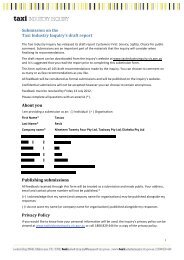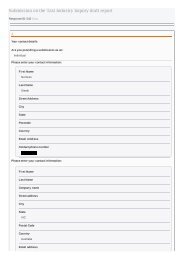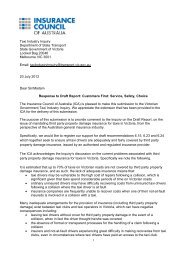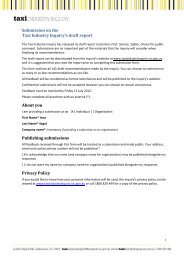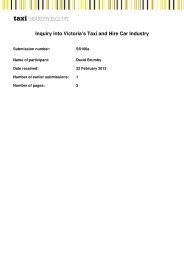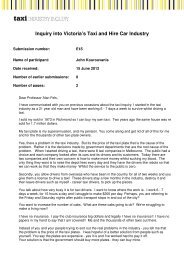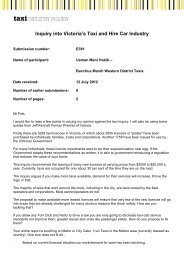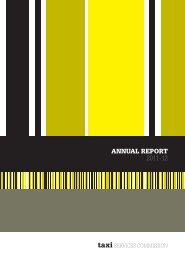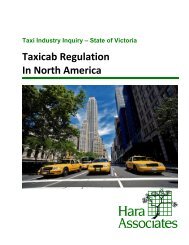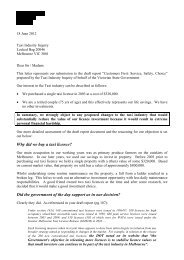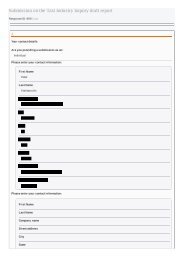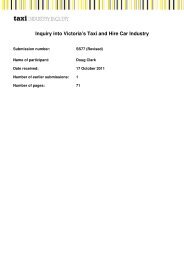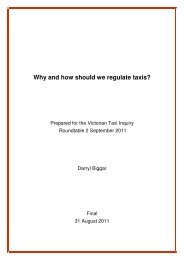Part D â Understanding and improving industry performance (PDF ...
Part D â Understanding and improving industry performance (PDF ...
Part D â Understanding and improving industry performance (PDF ...
Create successful ePaper yourself
Turn your PDF publications into a flip-book with our unique Google optimized e-Paper software.
Technically, the Act states that assignments cannot be<br />
‘renewed’. 78 This appears to mean that the maximum<br />
limit could be quite harmful in practice, although it is<br />
probably more likely that it is being ignored. Nonetheless,<br />
it still operates to disadvantage assignees of licences.<br />
The inquiry can see no reason for its retention.<br />
Inquiry finding<br />
è The three year limit on assignments<br />
is unnecessary <strong>and</strong> harms the interests<br />
of assignees without benefiting assignors<br />
of licences.<br />
10.4. Taxi-cab zones<br />
Taxi-cab licences are issued subject to conditions that<br />
restrict the areas in which taxis can operate. They<br />
also impact on competition between network service<br />
providers or depots.<br />
10.4.1. Current zones <strong>and</strong> conditions <strong>and</strong><br />
their rationale<br />
Licences are issued for the metropolitan zone, the outer<br />
suburban zone (covering D<strong>and</strong>enong <strong>and</strong> Frankston),<br />
the Geelong, Bendigo <strong>and</strong> Ballarat urban zones <strong>and</strong><br />
country zones.<br />
The boundaries of the metropolitan, outer suburban<br />
<strong>and</strong> Geelong urban zones are specifically designated<br />
by roads, while the boundaries of the Bendigo <strong>and</strong><br />
Ballarat urban zones are the areas within a radius of 13<br />
kilometres <strong>and</strong> 11 kilometres respectively of the main<br />
post offices. The Mornington Peninsula is covered by two<br />
zones – the Western Port <strong>and</strong> Port Phillip zones – the<br />
boundaries of which are defined by specific roads. The<br />
boundaries around country towns vary, with many being<br />
a designated radius from the local post office (see Table<br />
10.4). The size of this radius appears to vary widely for<br />
reasons that are unclear.<br />
However these boundaries are defined, it is likely that<br />
as settlement patterns <strong>and</strong> population change over time<br />
they will become less <strong>and</strong> less appropriate, unless they<br />
are changed.<br />
Table 10.4 Radius applying to a selected number of towns<br />
Bairnsdale<br />
Warrnambool<br />
Shepparton<br />
Traralgon<br />
Wodonga<br />
12 kilometres<br />
10 kilometres<br />
8 kilometres<br />
4.8 kilometres<br />
3.2 kilometres<br />
Generally, only cabs that are licensed to a particular zone<br />
can engage in rank (expressed as ‘st<strong>and</strong> at designated<br />
st<strong>and</strong>ing places’) <strong>and</strong> hail work in that zone. However,<br />
it is possible for taxis to undertake pre-booked work in<br />
other zones. For example, metropolitan taxis can operate<br />
in the rest of the state, with some restriction in the outersuburban<br />
zone. The condition placed on conventional<br />
metropolitan zone taxi licences is that “the licensed<br />
vehicle/s may be operated for the carriage of passengers<br />
from places within the metropolitan taxi-cab zone… or<br />
from any place in cases where the vehicle is ordered <strong>and</strong><br />
bespoken from an approved depot to any place within<br />
the State of Victoria, save <strong>and</strong> except on any journey<br />
wholly within the outer suburban taxi-cab zone...” 79 This<br />
appears to indicate that metropolitan-zoned taxis can<br />
undertake journeys that are wholly within the urban <strong>and</strong><br />
country zones when they are pre-booked.<br />
Similarly, outer suburban taxi-cabs can operate in their<br />
own zone <strong>and</strong> do pre-booked work elsewhere in the state,<br />
but cannot undertake a journey wholly in the metropolitan<br />
zone. Similar conditions apply in relation to the Geelong,<br />
Bendigo <strong>and</strong> Ballarat taxis, except that they are prohibited<br />
from undertaking journeys wholly in the metropolitan <strong>and</strong>/<br />
or outer suburban zones. Taxis licensed to the Western<br />
Port <strong>and</strong> Port Phillip zones are required to operate in those<br />
zones. Country-zoned taxis can undertake bookings<br />
outside their zones but cannot undertake any journey<br />
wholly within any of the non-country zones.<br />
The rationale for maintaining these restrictions is not<br />
spelled out clearly anywhere, but seems to reflect a<br />
combination of history, local taxi operator protection <strong>and</strong><br />
a desire to ensure the availability of services in specific<br />
locations. It has been suggested that the Transport<br />
Regulation Board introduced zones to ensure cabs were<br />
available in outer suburban areas, rather than just going<br />
where most of the work was available. However, if this was<br />
the case, it is difficult to explain why metropolitan-zoned<br />
cabs are prevented from undertaking journeys solely within<br />
the outer suburban zone by their licence conditions.<br />
78 See section 150(4C): An assignment under this<br />
section cannot be renewed <strong>and</strong> cannot be varied so<br />
as to extend the period of the assignment<br />
79 General condition 1.4, Conditions Governing the Operation of<br />
Metropolitan Zone Taxi-cabs, effective from 13 December 2008<br />
206



